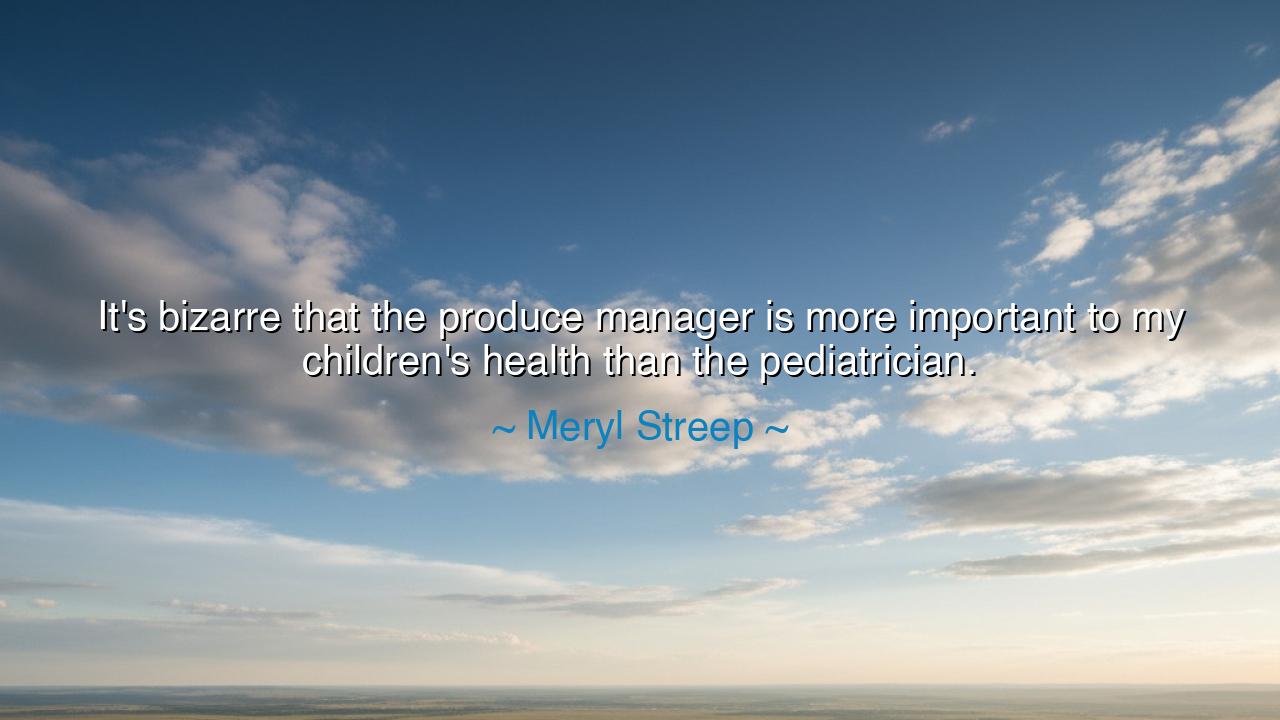
It's bizarre that the produce manager is more important to my
It's bizarre that the produce manager is more important to my children's health than the pediatrician.






“It's bizarre that the produce manager is more important to my children's health than the pediatrician.” — Meryl Streep
Hear now the words of Meryl Streep, a woman of grace and intellect, who in this single, striking sentence unveils the quiet irony of the modern age. Her words pierce through comfort and custom, calling us to see how far we have drifted from nature’s wisdom. She laments that in a world of medicine and progress, the produce manager — the keeper of fruits and vegetables, the silent gatekeeper of nourishment — has become more vital to her children’s health than the pediatrician, the learned healer of youth. It is a statement both humorous and grave, a cry of awareness that the fate of our bodies is bound not only to medicine, but to food, to the soil, to the unseen hands that feed us.
The origin of this saying lies in Streep’s lifelong advocacy for environmental and food safety issues. In the late twentieth century, as pesticides and industrial agriculture reshaped the very food that filled our homes, she began to speak out for the protection of children and the purity of their nourishment. She understood that no amount of medicine could undo the damage of a poisoned diet — that health begins not in the clinic, but in the kitchen; not with treatment, but with prevention. Her words are not an attack on doctors, but a plea for wisdom — to remember that the physician’s work begins with the farmer’s soil.
Her message echoes the wisdom of the ancients. The Greek philosopher Hippocrates, father of medicine, once declared, “Let food be thy medicine, and medicine be thy food.” He knew, as Streep reminds us, that the human body is an ecosystem — nourished or destroyed by what it consumes. The ancients did not separate health from nature, nor healing from nourishment. They saw the farmer and the healer as partners in the same sacred duty: to sustain life. But in our age of convenience, we have forgotten this union. We fill our baskets with food grown not by the rhythms of the earth, but by the demands of profit; fruits gleaming with color but hollow of vitality, grains stripped of life to please the eye and tongue. And thus, the produce manager — the one who decides which food reaches our tables — indeed holds the power once shared by healers and sages.
Consider, O listener, the tragedy of Minamata, a small fishing village in Japan. In the mid-twentieth century, its people began to suffer strange illnesses — tremors, blindness, and death. The cause was not a virus nor a plague, but mercury poisoning from a factory’s waste that had seeped into the sea and into the fish they ate. The villagers’ diet, once their sustenance, became their doom. This story stands as a monument to Streep’s truth: that the health of the people is bound to the purity of their food, and that those who manage or neglect this chain hold immense power over life itself.
Streep’s insight is also a rebuke to the arrogance of modernity — the belief that science alone can save us while we neglect the simplest foundations of health. The pediatrician can heal an illness, but cannot undo a lifetime of poor nourishment; can prescribe medicine, but cannot restore the soil from which nutrition springs. Our food has become so distant from its source that we trust machines and chemicals more than the rain and sun. And so she calls us to awaken — to recognize that wellbeing is not built in laboratories, but cultivated in gardens; that the healer’s art begins with the farmer’s care, and that prevention is the truest form of medicine.
In her wisdom, Streep reveals that the health of a nation begins at the market stall, at the family dinner table, in the choices made daily by mothers, fathers, and children. The produce manager, though unaware, holds the balance between sickness and strength, between dullness and vitality. Every piece of fruit unsprayed, every vegetable grown in living soil, is an act of protection for generations yet unborn. The foods we eat do not merely fill the stomach; they shape the mind, the mood, and even the soul. The corruption of food, then, is the corruption of civilization itself.
Let this be the lesson, O reader and guardian of life: take heed of what you eat, for it is the most intimate covenant between earth and flesh. Choose foods grown with respect for the land; support farmers who honor the living soil rather than exploit it. Teach your children that health is a daily practice, not a distant cure — that every bite they take is an act of creation or destruction. When you shop, do so with reverence, as though choosing the medicines of the body. For as Meryl Streep reminds us, the truest doctor is often not the one in a white coat, but the earth itself — if only we would listen to its wisdom and keep its fruits pure.
Thus, remember this truth as an inheritance of both science and soul: health begins where food is born. Protect that beginning, and you protect all that follows — the mind, the body, the generations yet to come.






AAdministratorAdministrator
Welcome, honored guests. Please leave a comment, we will respond soon